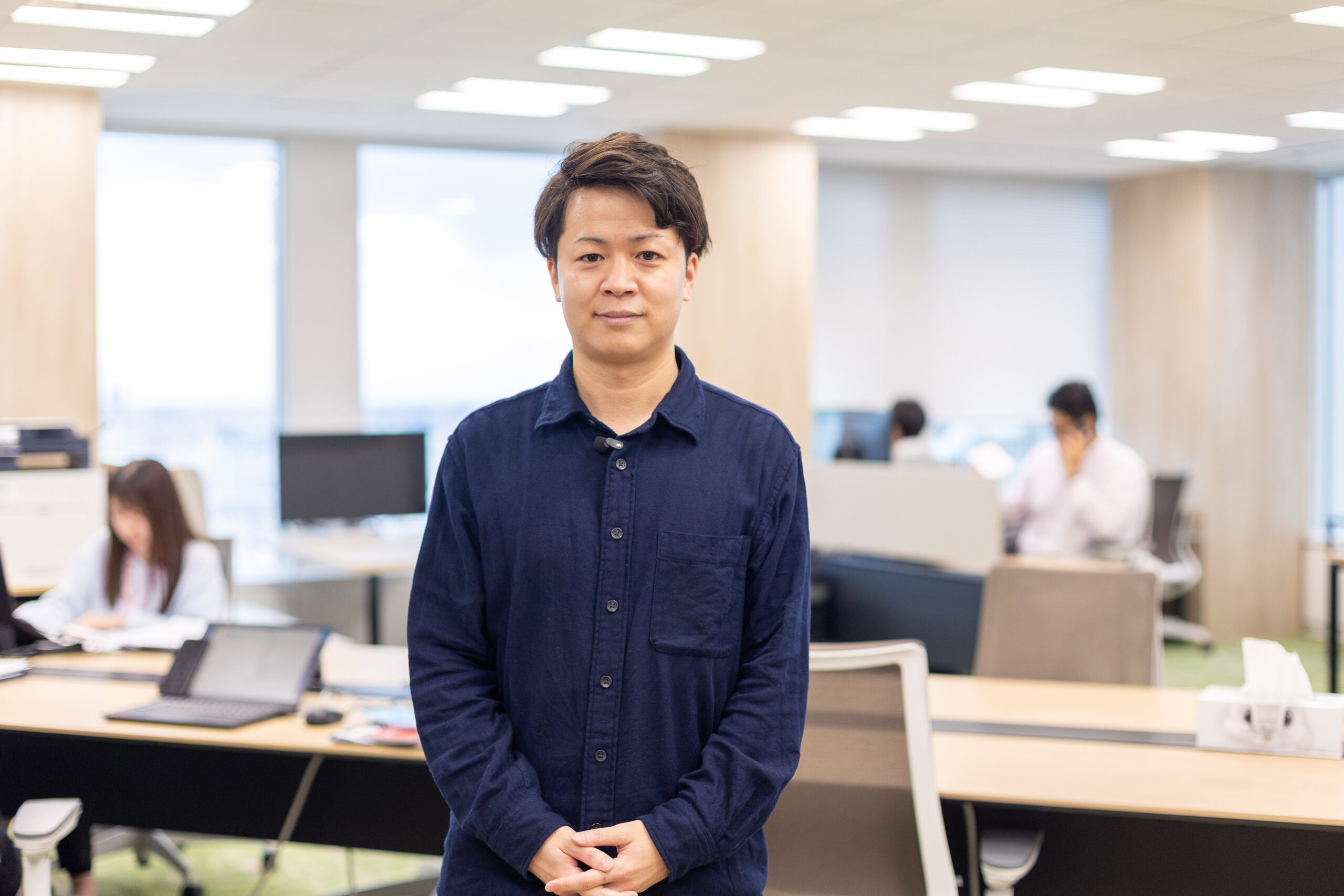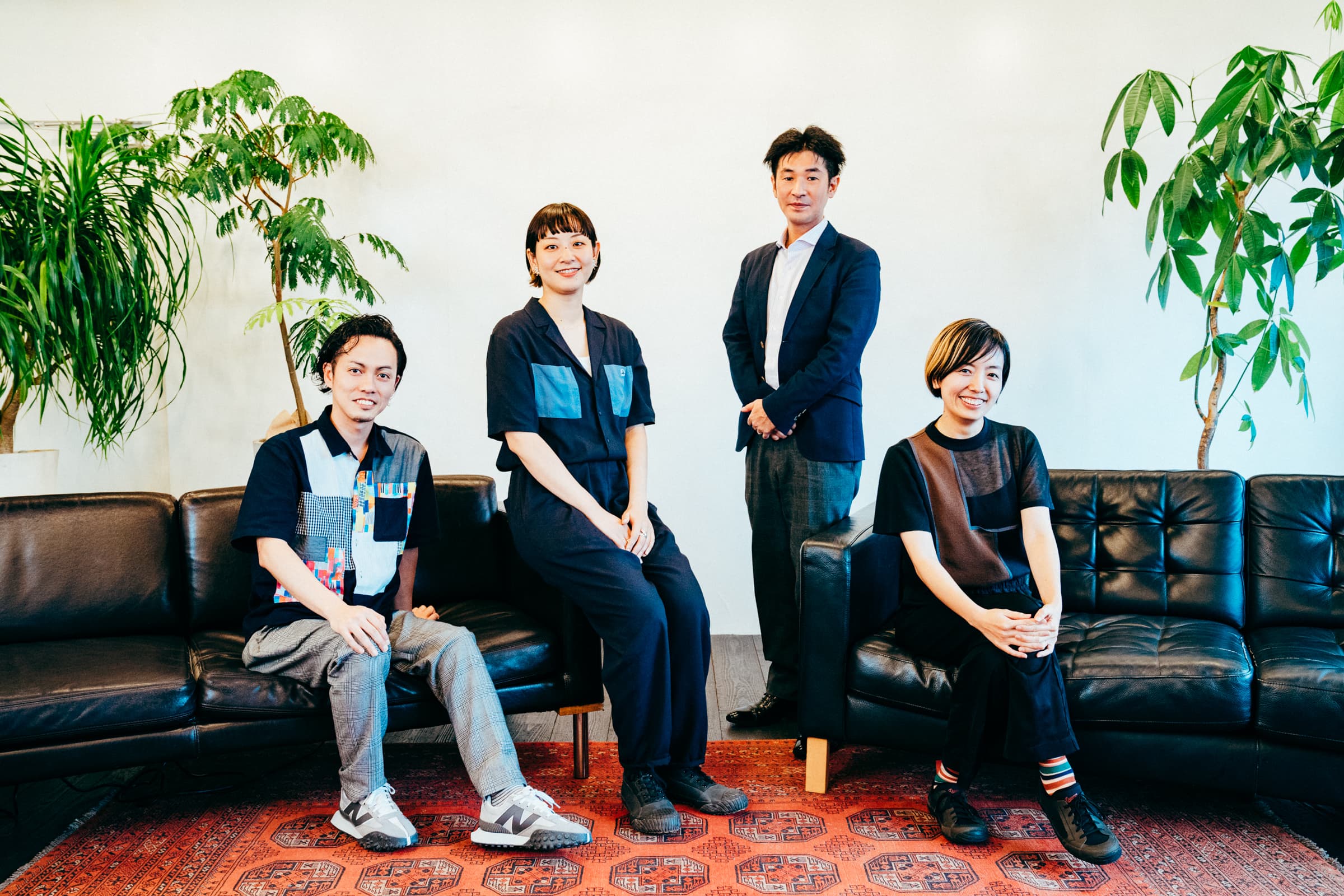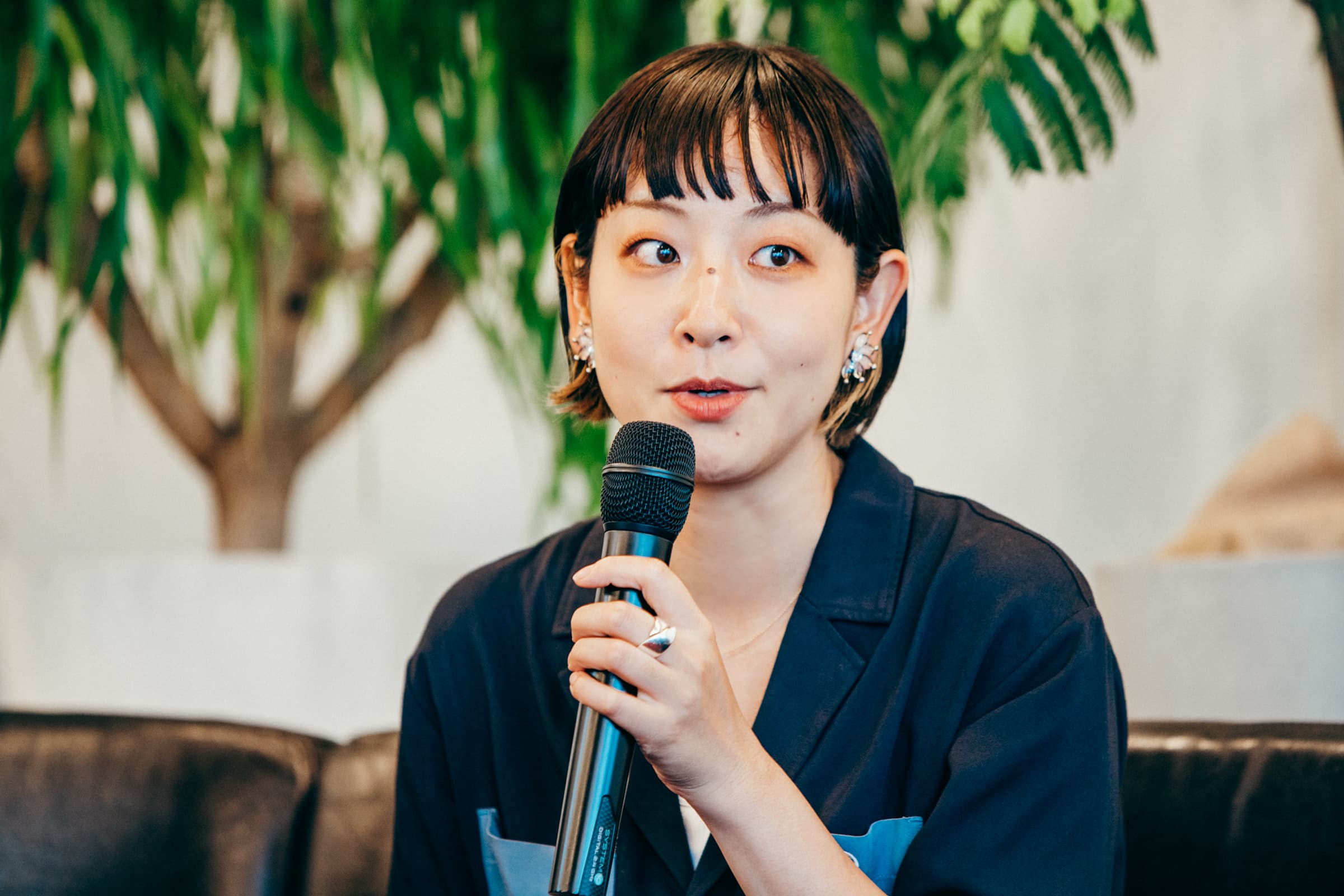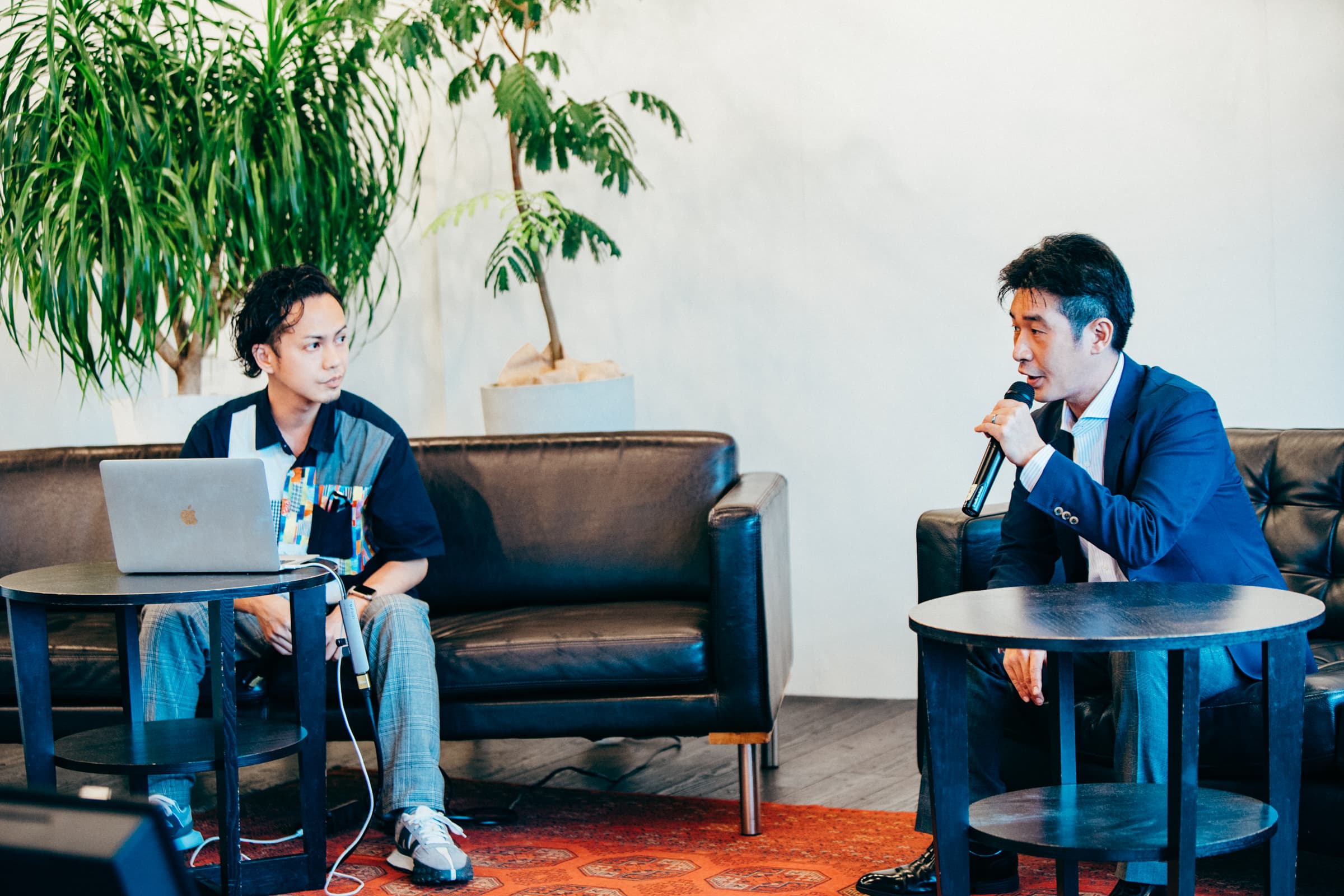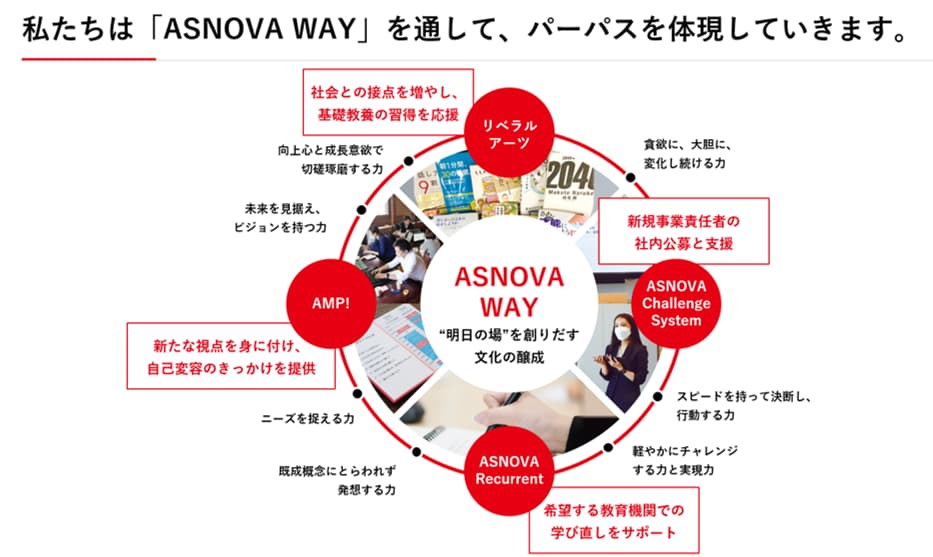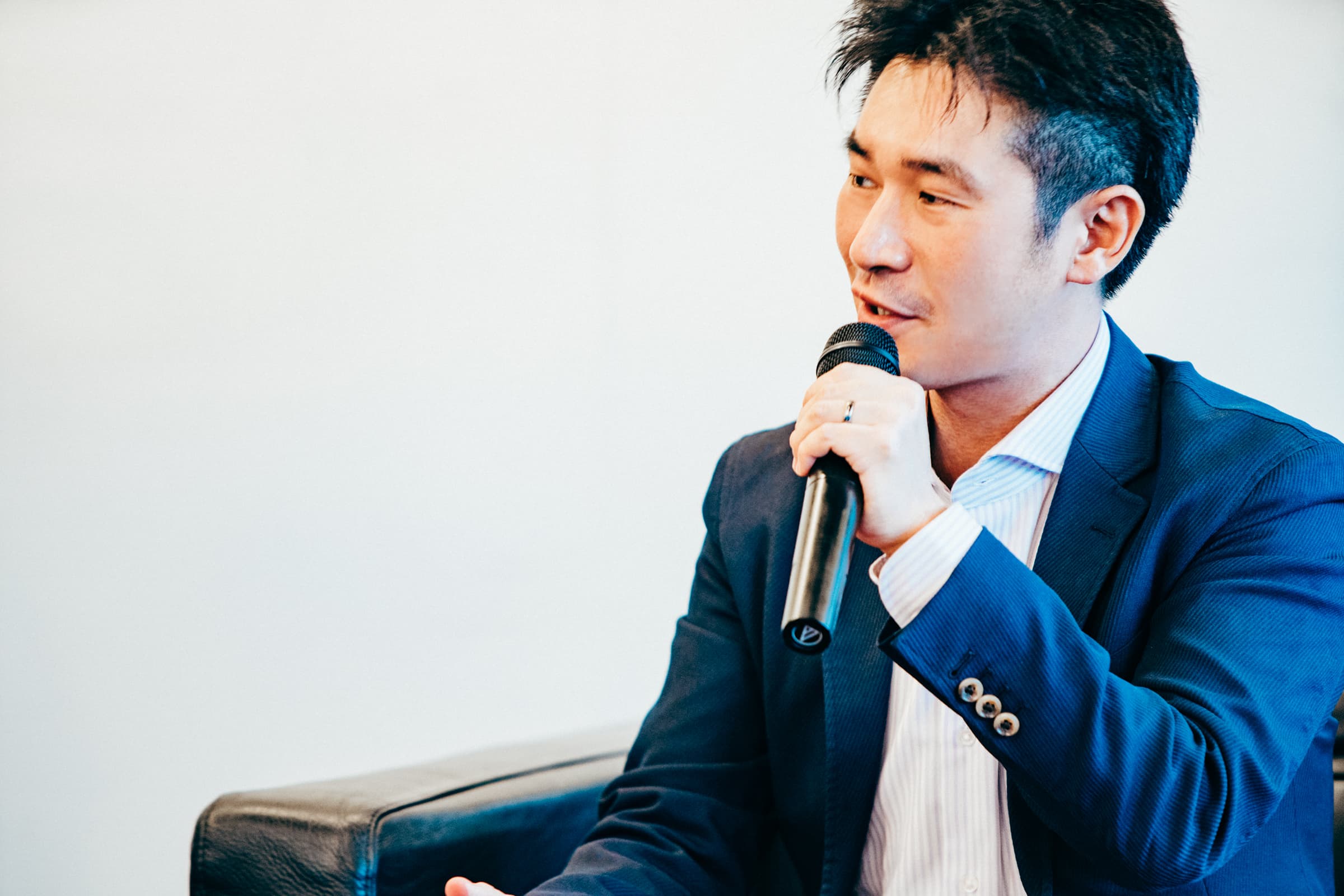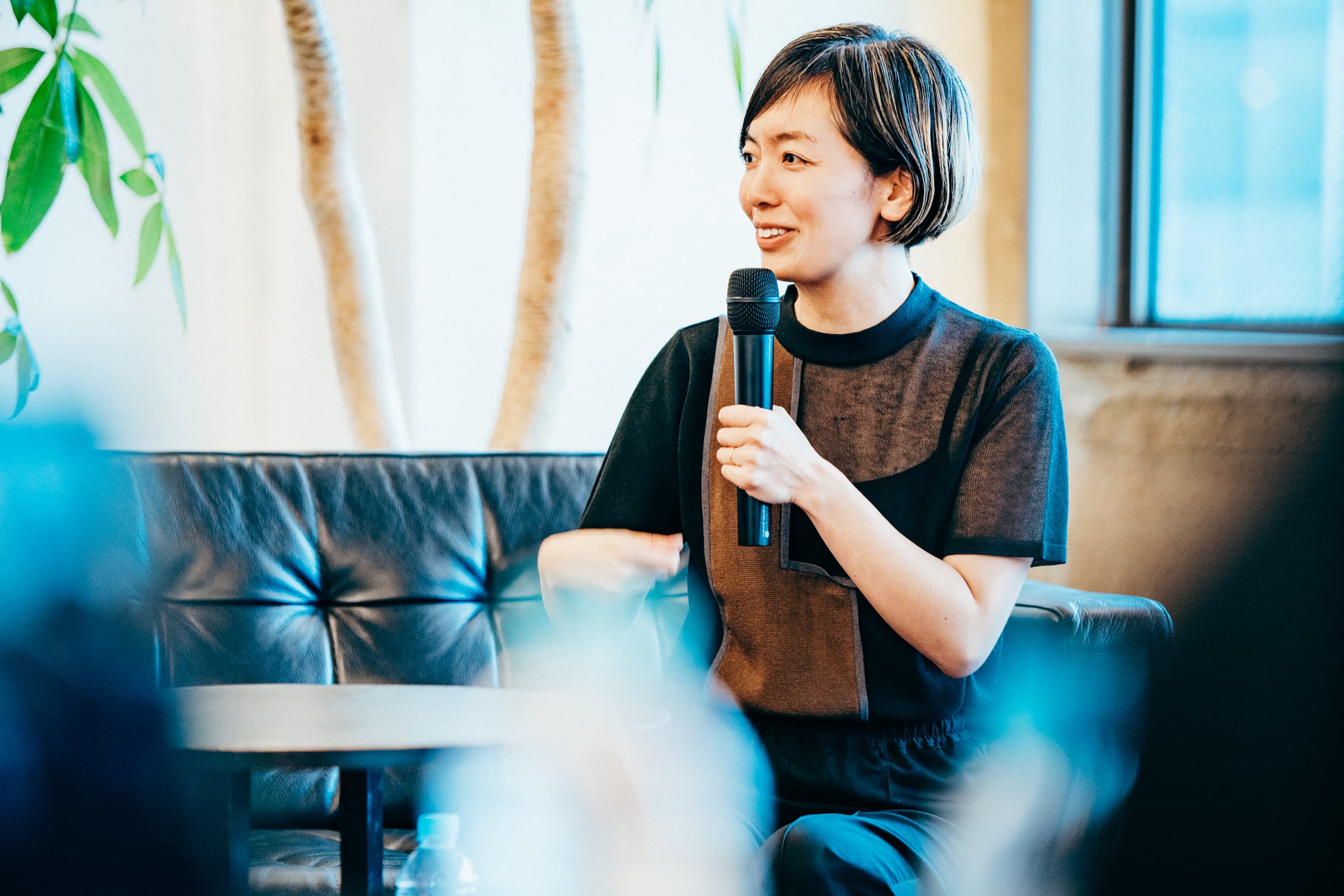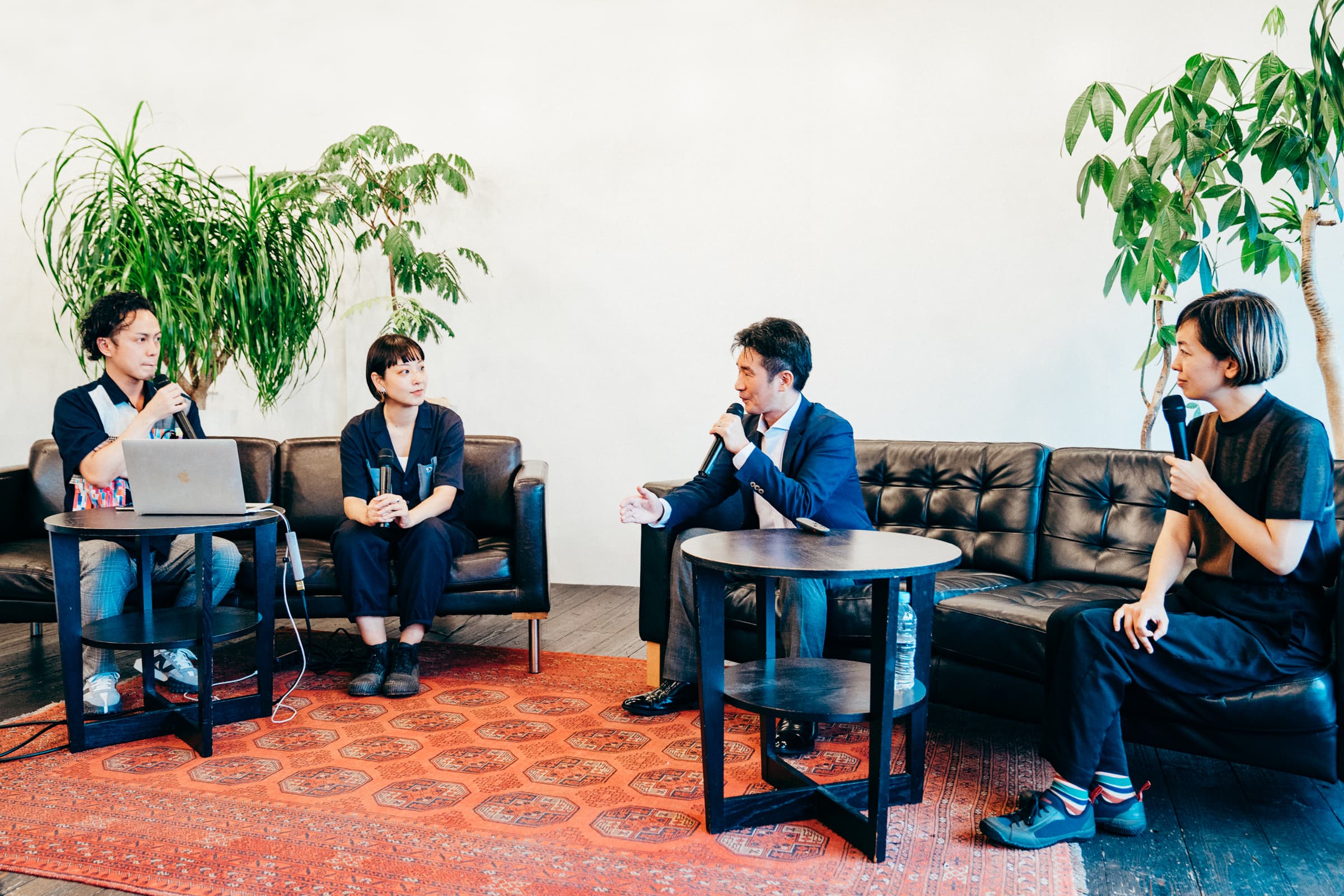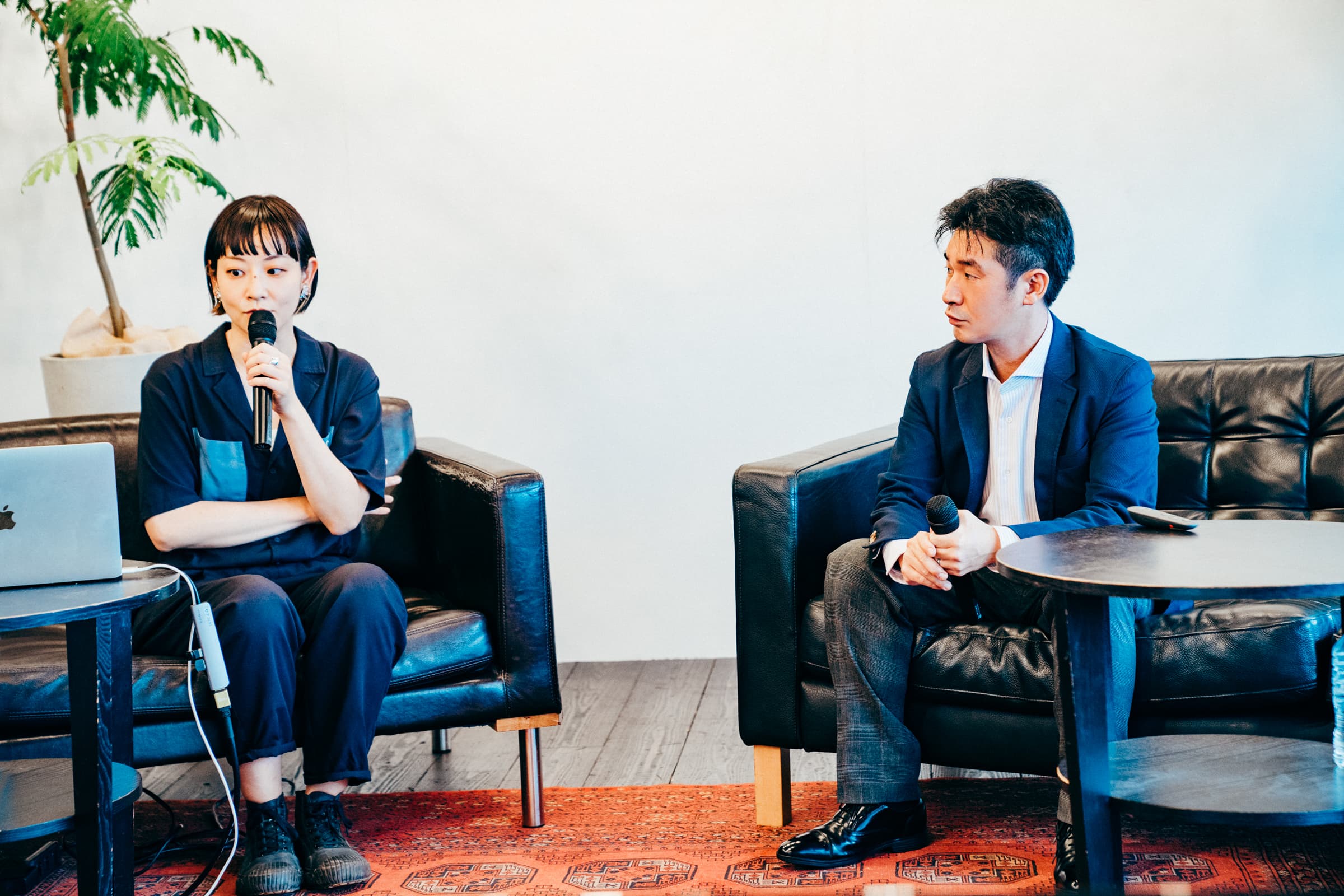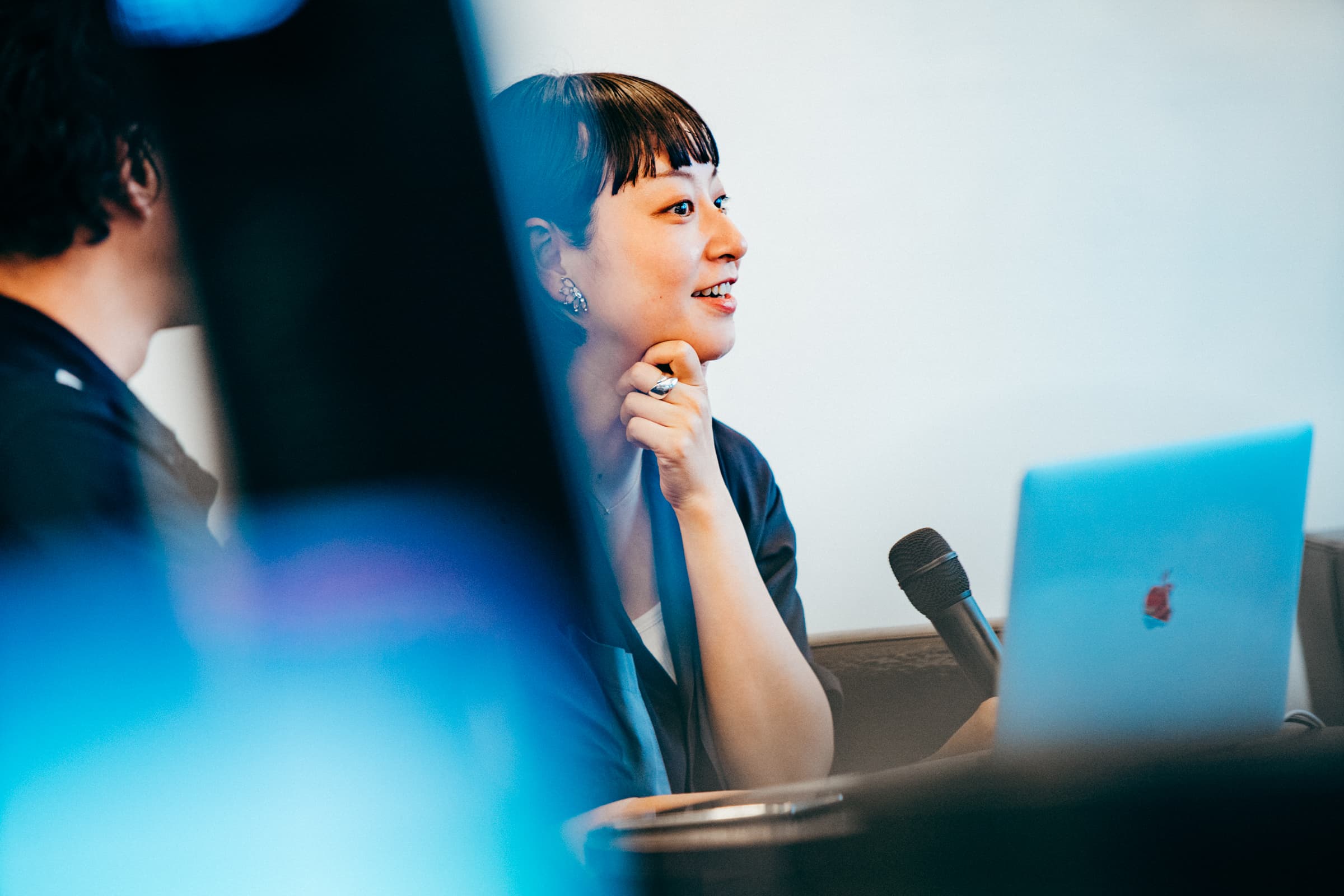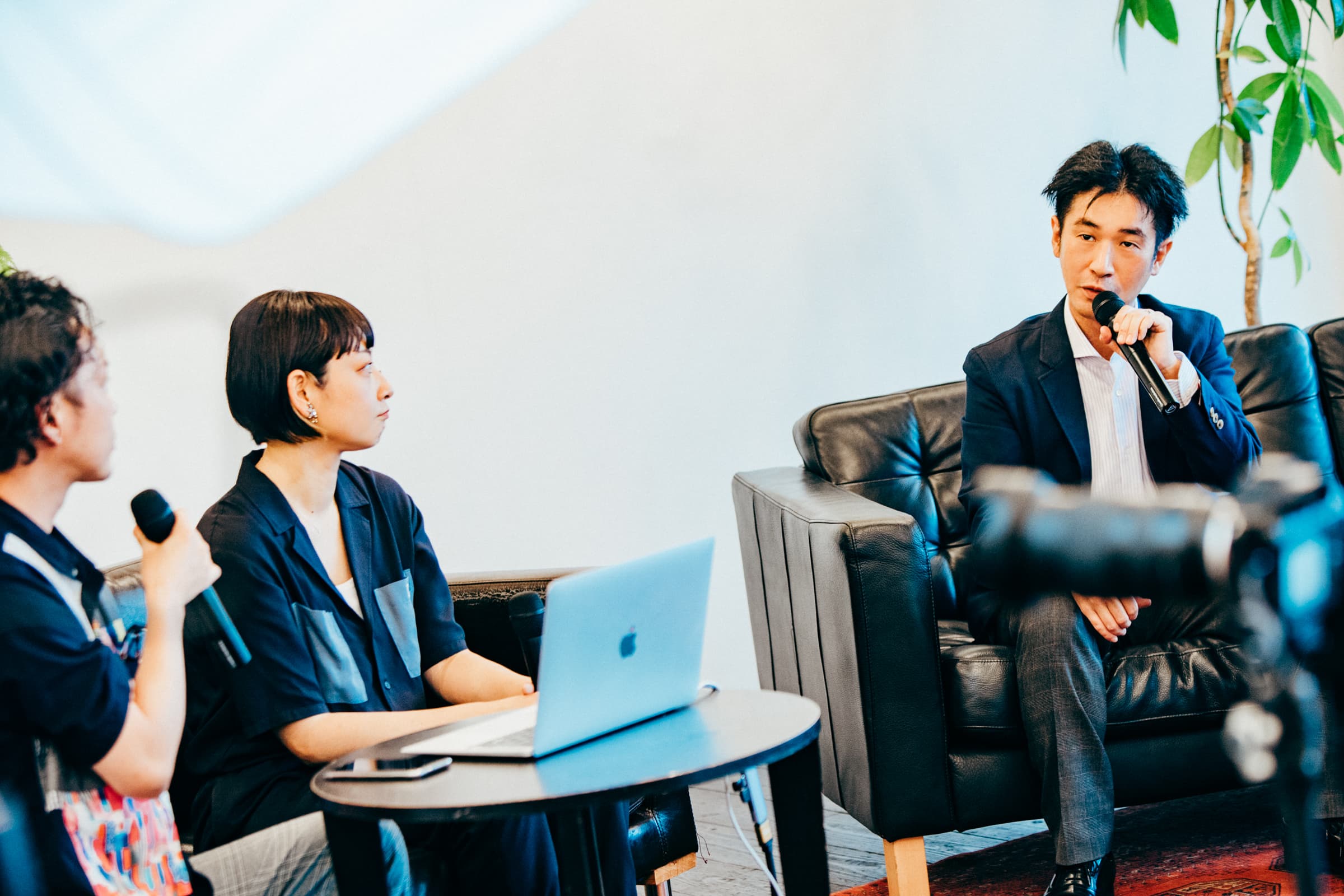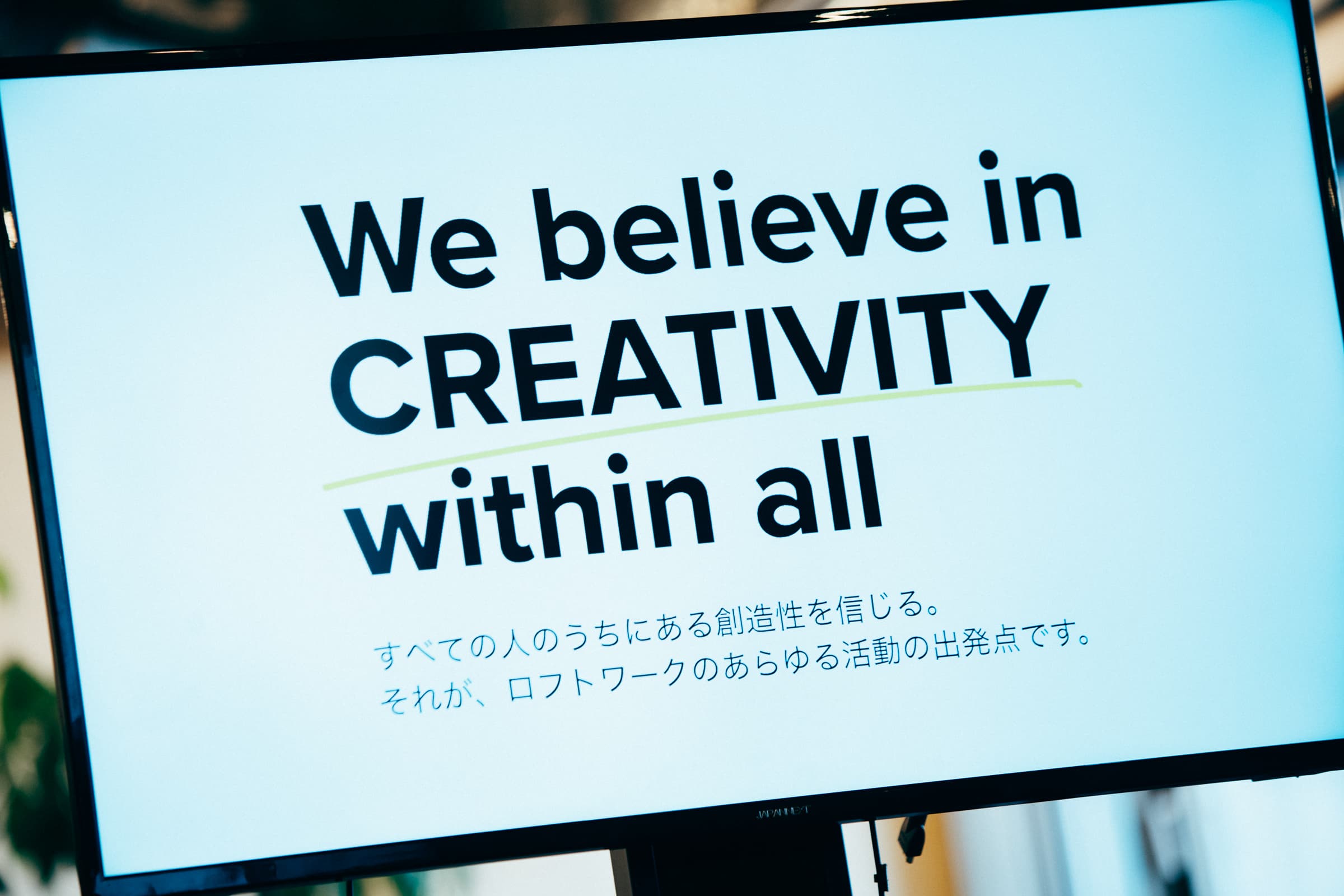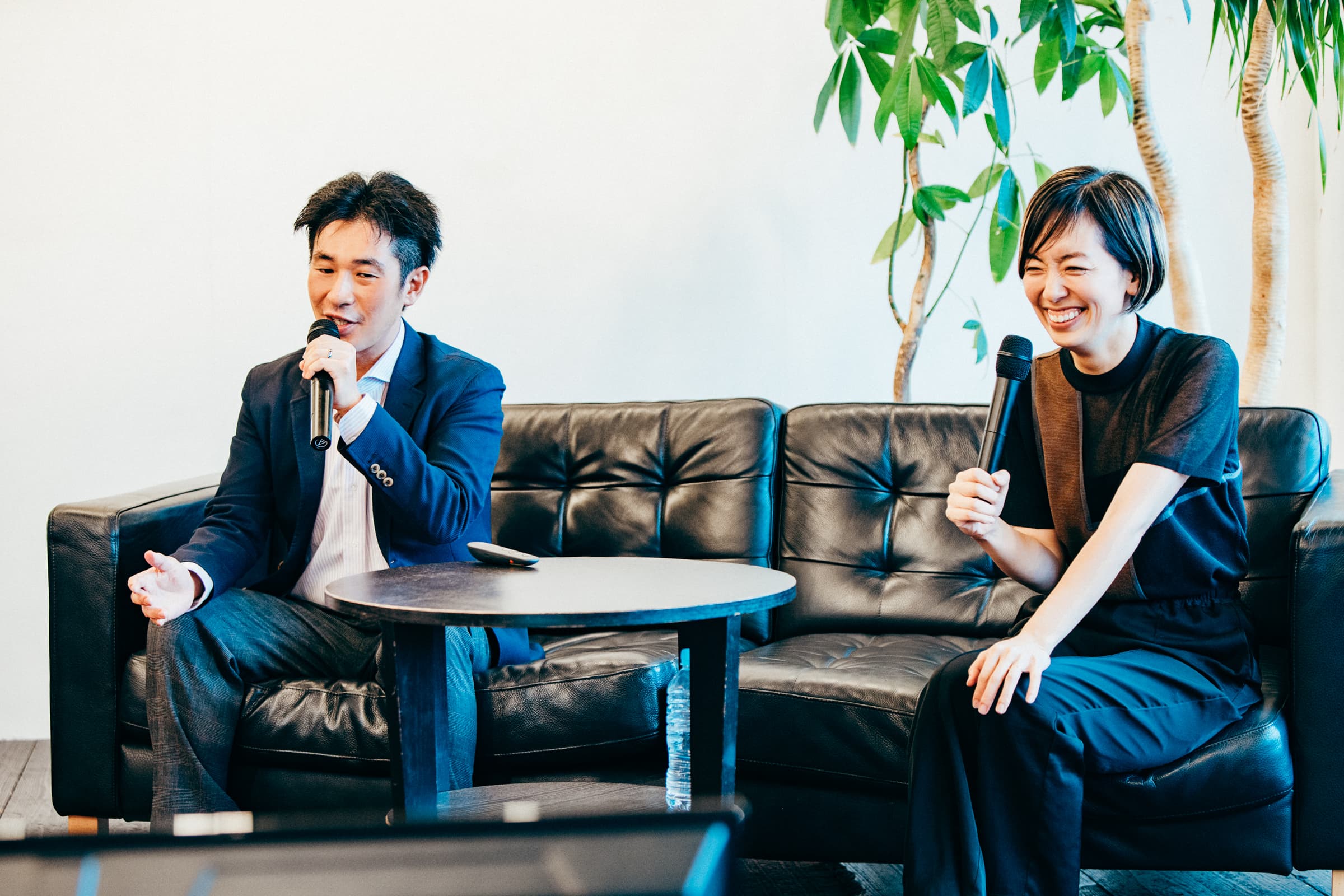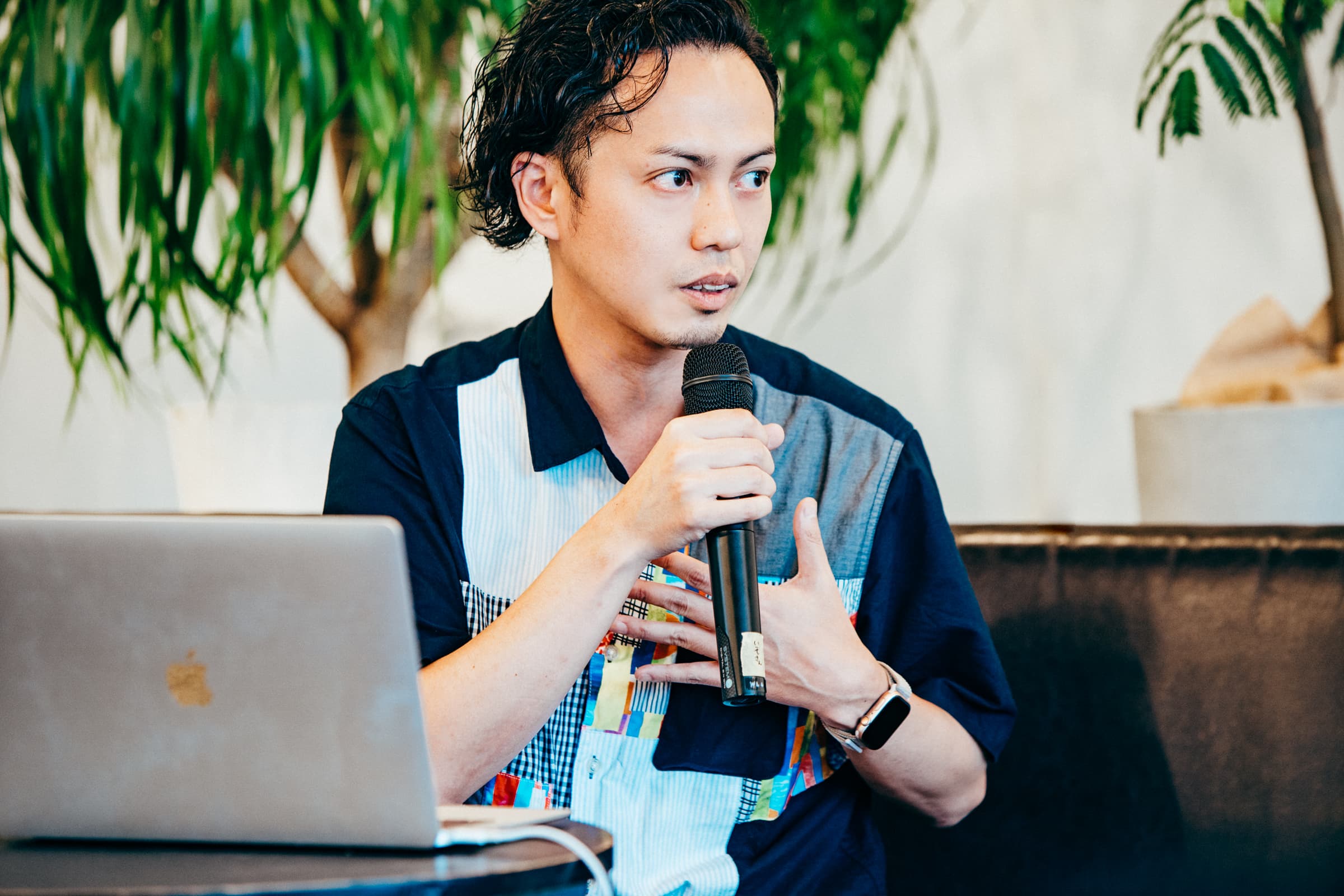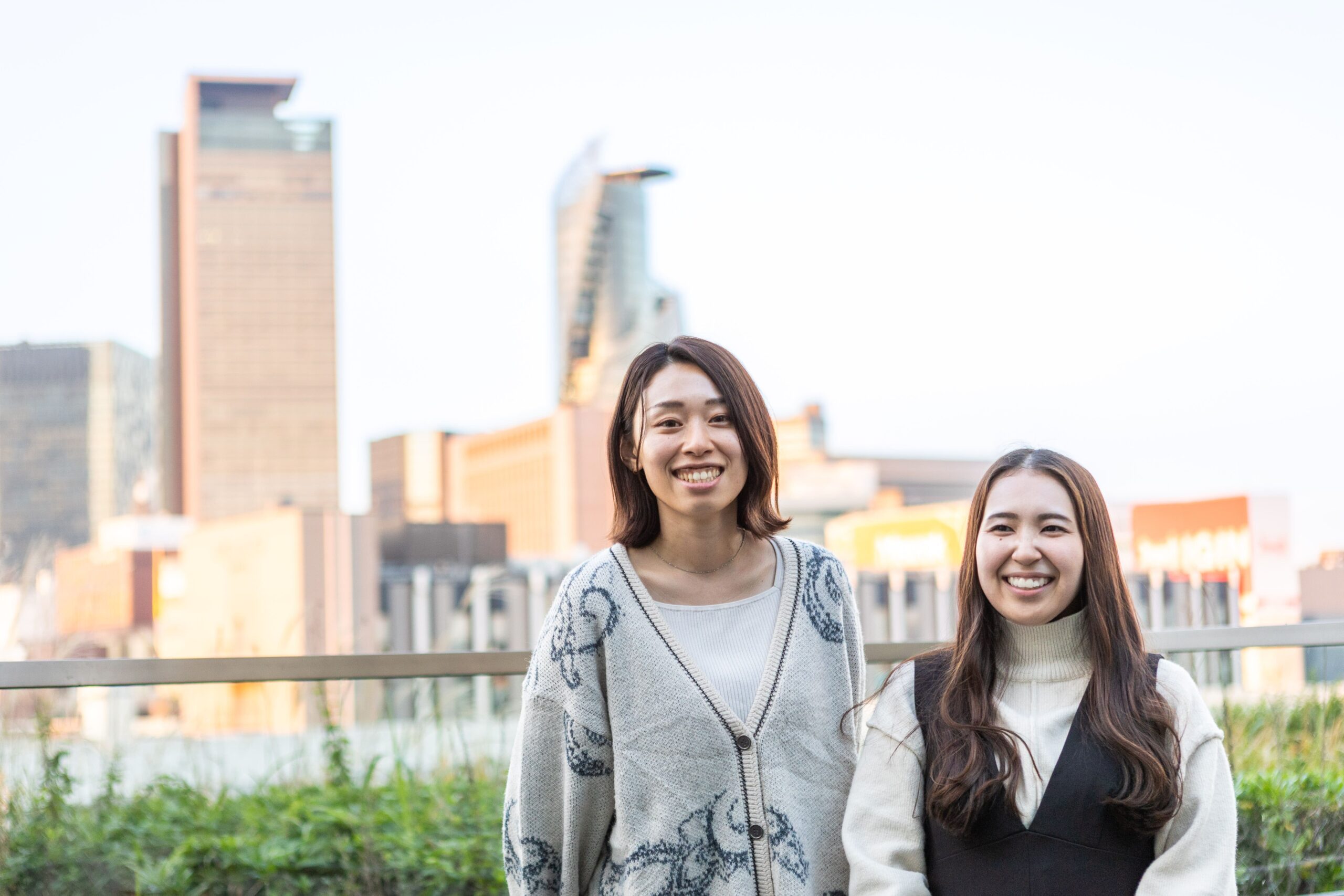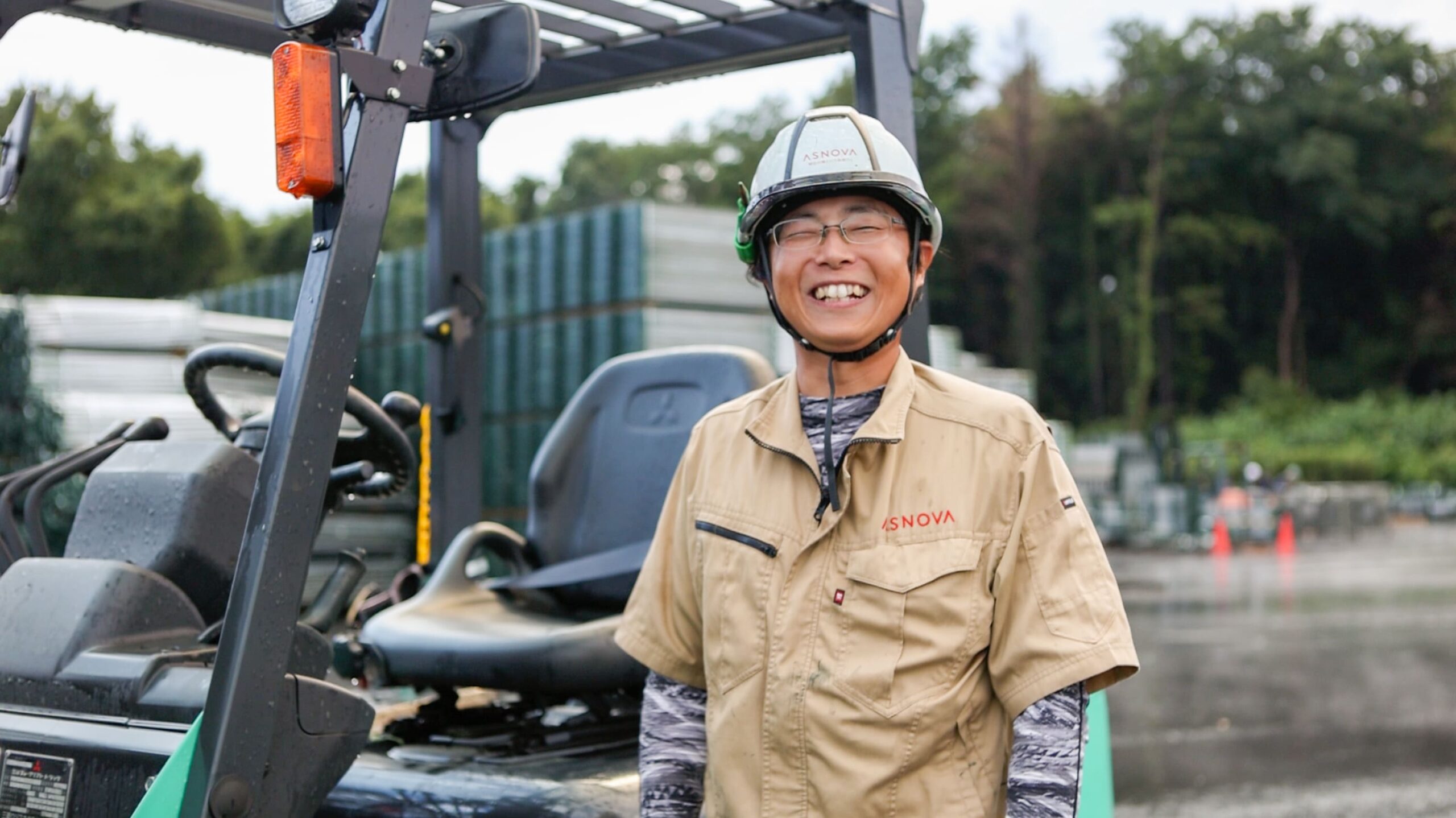企業ブランドをつくる人事改革
江澤身和さん(株式会社スープストックトーキョー取締役副社長 兼 人事本部長)
1つ目のケーススタディとして登壇したのは、株式会社スープストックトーキョー取締役副社長 兼 人事本部長の江澤身和さんです。パートナー(アルバイト)からスタートして異例の昇進を遂げた江澤さんは、6年前に発足した人材開発部の責任者となり、新たな採用・育成の仕組みづくりに取り組んできました。
江澤さんが最初に着手したのは、現場の社員の声を聞くこと。一人ひとりとの面談を重ねる中で見えてきた各店舗が抱える課題を、会社の経営課題だと捉えて向き合っていきます。
「私たちは『世の中の体温をあげる』という企業理念を掲げていますので、営業も人事もこの理念がすべての物差しになります。ですから、現場で働いている社員やパートナーさんの体温をあげることが、私たちのミッションだと思って動き始めました」
新たな人事制度づくりをスタートした江澤さん。そこで、一つの気づきを得たと言います。
「最初は、今目の前で起きていることを一つずつクリアしていこうと、手前から物事を考えていました。でも社長から、『その考え方だと一歩目に何年もかかって、二歩目はさらに先になる。現状を把握するのは大事だけど、最終的にどうありたいかというシーンを描いて、逆算して考えたほうがいい』と助言をもらったんです」
この助言を受けた江澤さんは、企業理念に基づいて理想のシーンを思い描き、そこに向かって進んでいくという考え方に大きく切り替えたと言います。そうして始まったスープストックトーキョーの人事施策は、社内SNS「Smash」、おもてなし成果発表会「SSTグランプリ」、複業を解禁した「ピボットワーク制度」、新規プロジェクトを支援する「やりたいことコンペティション」など、現在さまざまな形で展開されています。
「まだまだ道半ばで、最初に描いた理想のシーンには達していないこともたくさんありますが、こうした制度や仕組みによって、社員のスキルや経験値を上げていくことが、少なからずできているんじゃないかと思います」
業界イメージを刷新する人材育成制度とメディア戦略
左から小島和人さん(株式会社ロフトワーク プロデューサー)、加藤大介さん(ASNOVA取締役 管理本部長)
続いて、ASNOVA取締役 管理本部長の加藤大介さんが、ASNOVAと共同でプロジェクトを手がける株式会社ロフトワーク プロデューサーの小島和人さんと共に登壇しました。
加藤さんが紹介したのは、新たな事業やサービスを担う人材育成を目的とした人事制度「ASNOVA WAY」。外部クリエイターと協業し気づきを得ながらアウトプットを生み出す「AMP!」、社会人向けの大学院など社外で知識を身に付ける場を設ける「ASNOVA Recurrent」、起業家精神を持つ人材育成を図る「ASNOVA Challenge System」からなる制度です。
さらに、メディア戦略として、2022年4月からスタートした公式オウンドメディア「カケルバ」についても紹介。カケルバを通じて、「ASNOVA WAY」を含めた独自の取り組みを発信することで、採用活動においても応募者数が増えたり、今までには来なかったようなタイプの人材が応募してきたりと、変化の兆しが見えていると言います。
「この2~3年で多くの施策に取り組んでいますが、社内外の反応はどうですか?」と小島さんが問いかけると、「制度を利用して外部の教育機関に通っている社員や、AMP!のプログラムに参加した社員から、周りの社員にも少しずつ影響が伝播し始めています。社外からも『面白いことをやっているね』と注目していただく機会が増えました」と加藤さん。
しかし、施策を次々と進めていくうちに、ふと立ち止まった瞬間があったと言います。
「そもそもなぜこの取り組みをやっているのか。やる/やらないの判断基準はどこにあるのか。そんな迷いが出てきた中で、やはり基準が必要だという話になり、『カセツの力で、社会に明日の場を創りだす』というパーパスを制定しました。現在は、このパーパスがいかに浸透するか、パーパスに基づいていかに組み上げていくかを判断軸にしています」
この話を聞いて、「スープストックトーキョーさんのように理念を起点に進めるのではなく、まずやってみてから振り返ることによってパーパスを築くというのは、スピード感がすごいASNOVAさんならでは」と小島さん。「まずはやってみて、浸透するまで継続する。早く実行して早く軌道修正することを繰り返す。それが当社の社風かもしれません」と加藤さんが笑顔で答えます。
最後に加藤さんは、「目の前のことでいっぱいになってしまうと、新しいアイデアや業務改善は生まれない」と、「ASNOVA WAY」の一環としてスタートしたリベラルアーツ制度についても紹介しました。この制度は、全社員が複数ある推薦図書のコースを選択し、該当する書籍が毎月配布されるというもの。社員同士で本を交換したり、本の内容について会話をしたりというコミュニケーションも生まれ、社員全体の視座を上げる取り組みとなっているそうです。
個々人の創造性を引き出す文化醸成の挑戦
岩沢エリさん(株式会社ロフトワークCulture Executive/マーケティング リーダー)
3つ目のケーススタディとして登壇したのは、株式会社ロフトワークCulture Executive/マーケティング リーダーの岩沢エリさんです。岩沢さんは、ロフトワークが「個々人の創造性を引き出す文化醸成」を行っている理由について、こう説明します。
「私たちは、個々人の多様な創造力が企業の可能性を広げると考えています。一人ひとりの創造力が企業を通じて結集され、社会を変えていくような価値を生み出す。それが新しい事業や活動にもつながっていくんじゃないかと思います」
まず岩沢さんは、数あるロフトワークの取り組みの中から、「一人のやりたい!から始まるプロジェクト」として、デジタルとリアルの壁を横断しながらイノベーションを生み出す「FabCafe」や、参加型アーバニズムをテーマに都市の体験を立体的にプロデュースする実験ユニット「LAYOUT」の事例を紹介。「一人の好奇心の探求や実現したいビジョンは、組織の新領域開発/事業開発の原動力にもなる」と語ります。
そして、「未知なる自分の好奇心に気づき、小さな好奇心の種を育てていくための、機会やコミュニティが大切」だと、小さな創造活動をする合宿や社内外で学び合う勉強会、FabCafeで行われているプロジェクト・イン・レジデンスのプログラム「COUNTER POINT」といった事例を紹介します。
さらに、「推奨する活動や行動は、評価にも組み込んでいる」と、OKRという目標管理法を使って、「Performance」「Leadership」「Presence」の3つを軸にして評価するロフトワークの評価制度についても紹介しました。
「“We believe in Creativity within all”、すべての人のうちにある創造性を信じる。それが私たちのあらゆる活動の出発点です。Creativityをどうやったら解き放てるんだろうと考える中で、今日お話した以外にもたくさんの施策や活動を行っています。まだ道半ばですが、今日は皆さんと議論をしながら、さらにブラッシュアップしていくためのヒントが見つかればと思っています」
施策成果と個人評価のあり方とは?
ここからは小島さんをモデレーターとして、クロストーク形式で議論を深めていきます。多くの施策を行ってきた三社ですが、施策の成果をどのように測っているのでしょうか。また、その先にある変化した個人を、どのように評価していくのでしょうか。江澤さんは、「人事のことは、成果が表れるまでに時間がかかるし、すごく測りづらいですね」と話します。
「数字を使って定量的に測れる成果もあれば、どうしても数値化できない定性的な成果もあると思うんです。私たちの場合は、人事制度など『人』について社外から取材などの問い合わせをいただけるようになったことは、一つの成果だと捉えています。今日この場に呼んでもらったこともそうですね」(江澤さん)
このお話を受けて小島さんは、「ASNOVAさんとAMP!の取り組みを始めた時、良いプログラムを作るのはもちろんですが、同時に『AMP!が第三者から評価されて、それを見た新しい人が来てくれるようにしたい』とおっしゃっていたのを思い出しました。自社で評価できる部分は評価して、自社だけで測れないものは第三者の目線を借りて、その評価をメディアなどで使って発信していくと良いのかもしれませんね」と、メディア戦略とのつながりについてコメントしました。
続いて加藤さんは、ASNOVAの人事評価についてこう語ります。
「ASNOVA WAYを始めたばかりの頃、新規事業人材に注力するあまり、偏りが生じてしまったという反省点がありました。当社の場合、現場で日々の売上を積み上げている社員が大半で、新規事業にトライしようとする社員のほうが圧倒的に少数派ですから、新規事業人材ばかりを高く評価すると、人事制度のバランスが悪くなってしまう。そこで、パーパスに沿った人材を作ることに改めて立ち返ったという経緯があります。課題にぶつかるたびにパーパスに戻ることを、ずっと繰り返していますね」(加藤さん)
岩沢さんも、「半期目標を設定しても、半年後にはその目標では評価しきれないというケースもある。変化に合わせて柔軟に対応していくことも必要かもしれません」と評価制度の難しさを語ります。
「でも、自分の目標を言葉にして表明してみること自体に意味がある。表明すると、『じゃあ一緒にやろう』とか『どうやったらできるかな』とみんなで考えるきっかけにはなるので、それがすごく大事だと思いますね」(岩沢さん)
まず小さく始めて、社内外を巻き込んでいく
表明することが、みんなで考えるきっかけになる。そんな岩沢さんの言葉から、話題は「社内外の巻き込み方」へ。小島さんが「いろんな考え方の人がいるから、『私はこの施策は嫌です』と言われることもありませんか?」と投げかけると、江澤さんはこう語ります。
「みんながみんな共感することって、そもそもないと思うんです。だからといって平均値を取っていくと、結果的に誰にも刺さらないものになる。だから、たとえ少数でも、共感して興味を持ってくれる人を巻き込んで、そこからどんどん広げていく。賛否があるということは、ある意味、一石を投じられているということですから、まず小さく始めることが大切だと思います。一つのお題に対して賛否の声が挙がれば、社員の声を聞くきっかけにもなります」(江澤さん)
この話を聞いて、「なるほど、ちょっとざわっとするような状況を作ることで、対話が生まれるのかもしれませんね」と小島さん。さらに、「こういった現場とのギャップは、ASNOVAさんもたくさんあったのでは?」と加藤さんに水を向けます。
「良かれと思って作った人事制度が、全然フィットしなかったことはありますね。それは制度自体が悪いのか、浸透していないことが悪いのか、個々で検証が必要なんですけど。会社が作った制度に対して、どうしても社員の『やらされ感』が出てしまうことがあるので、『こういうことをやりたい』という社員の声と、会社としてやってほしいことを、うまくミックスさせながら作り上げていこうと心がけています」(加藤さん)
江澤さんと加藤さんのお話を受けて、岩沢さんはこう続けます。
「ロフトワークの場合は、『やってみたい』という2~3人が集まった時のエネルギーを大切にしているので、先ほどの『小さくてもまず形にしてみる』という江澤さんのお話にすごく共感しましたね。進化していく最初の時期って、本当に生まれたてのものだから、誰も評価ができないはずなんです。だから、生まれる前に良いか悪いか考えるよりも、まずはやってみる。そこから周りを巻き込んでいく熱量が生まれるんじゃないかな」(岩沢さん)
人材への「お金・時間・役割」の投資
まだ価値がわからない生まれたてのものに対して、企業はどのように投資していけるのでしょうか。お金を投資するのか、時間を投資するのか、あるいは役割を投資するのか。小島さんが問いかけると、江澤さんは「私たちの場合は、まず時間」と答えます。
「飲食の業態では、日々時間に追われているので、まず私たちは時間を作ってあげなきゃいけない。好きなことややりたいことのために、プライベートの時間だけじゃなくて働く時間を使ってもいいんだっていうことを、会社が発すること、そのための時間を渡すことが、一つのメッセージになると思っています」(江澤さん)
岩沢さんは、役割への投資についてこう語ります。
「私自身、Culture Executiveという役割を渡されたことによって、新しく見えたこともあるんですね。だから、その人ができるかまだわからないことに対してもどんどん役割を与えていくのは、投資の一つの手段じゃないかと思います。それはリーダー職だけじゃなくて、『特命何とか』みたいな特別な肩書でもいいですよね」(岩沢さん)
2人の話を聞いて、「時間と役割への投資は、すぐに始めやすいけれども変化に時間がかかる印象があります。一方で、お金の投資は変化のスピードを上げることができるのかもしれません」と小島さん。すると、加藤さんはお金の投資についてこう話します。
「AMP!はロフトワークさんの協力のもとで進めていますが、これをもし自社だけでやろうとしていたら、実現までに5年10年かかっていたと思うんです。将来的に内製化したいという思いはもちろんありますが、まずは先行投資をして、他社の協力を得てやってみる。そうすれば、良かった点・悪かった点を早く知って、早く判断できます」(加藤さん)
未来のために、種をまくこと
最後に、イベントのテーマである“創造的”人材はどうやったら作っていけるのか?と小島さんが問いを提示すると、岩沢さんはこんなふうに話します。
「開かれた機会を作っていくことが大事なのかなと、皆さんのお話を聞いて改めて思いました。個人のやってみたいことや好奇心を解き放ってみて、そこから何が育ってくるのか。そういう場をみんなで少しずつ作っていくことじゃないかなと思います」(岩沢さん)
すると小島さんは、「何だかわからないまま投資をすることですね。岩沢さんのお話を聞いて、何かわからない種を土に植えていくシーンをイメージしました。芽が出るのは1年後か5年後か、あるいは20年後かもしれないけれど、それくらいの投資だと考えないといけないのかもしれません。『焦るな』っていうことですね」と笑います。
「焦らず、植えてみよう。そのために、土は耕しておこう」。そんな岩沢さんと小島さんの言葉に、江澤さんと加藤さんも笑顔で大きく頷きました。
90分間のトークイベントを通して、三社三様の取り組みと試行錯誤の過程、それぞれの根底にある「人」への思いと、その先につながっていく未来が垣間見えたひとときでした。
